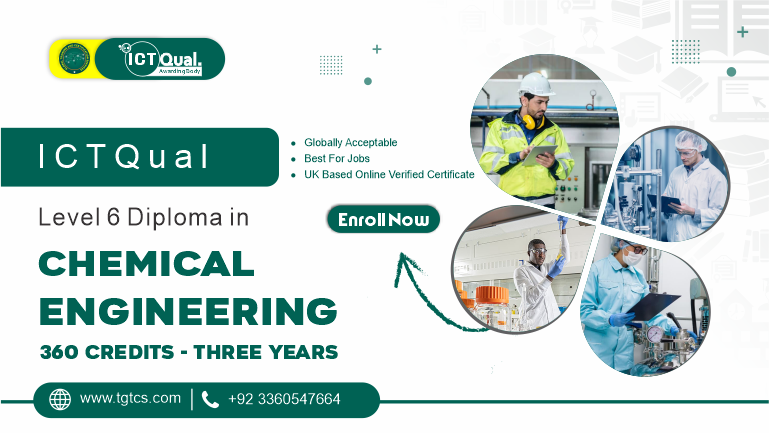ICTQual Level 6 Diploma in Chemical Engineering 360 Credits – Three Years
If you’re passionate about chemistry and engineering, and you want to make a significant impact on industries ranging from pharmaceuticals to energy, the ICTQual Level 6 Diploma in Chemical Engineering (360 Credits – Three Years) offers the perfect pathway to a rewarding career. This comprehensive, industry-focused diploma provides students with the advanced knowledge and practical skills required to excel in the dynamic field of chemical engineering.
The ICTQual Level 6 Diploma in Chemical Engineering is a rigorous three-year program designed to equip students with a robust understanding of chemical engineering principles, practices, and innovations. Covering a wide range of essential topics—from process engineering to sustainable practices and advanced chemical technologies—the course prepares students for leadership roles in various industries.
The ICTQual Level 6 Diploma in Chemical Engineering is an excellent choice for students who are passionate about chemistry and engineering and want to make a significant impact on industries like pharmaceuticals, energy, and environmental sustainability. With a comprehensive curriculum, practical experience, and a focus on sustainable solutions, this diploma equips graduates with the skills and knowledge needed to succeed in a variety of exciting career paths.
The Global Training and Certification Services (TGTCS) is Directly Approved Training Centre of ICTQual
The ICTQual Level 6 Diploma in Chemical Engineering (360 Credits – Three Years) is a comprehensive, industry-focused program designed to equip students with advanced knowledge and practical skills in chemical engineering. Over three years, the diploma covers key topics such as process engineering, thermodynamics, chemical reaction engineering, fluid mechanics, and sustainable engineering practices. Students gain both theoretical understanding and hands-on experience through lab work, industry placements, and real-world projects.
Graduates are well-prepared for a variety of roles in industries such as pharmaceuticals, energy, manufacturing, and environmental engineering. Career opportunities include positions as chemical engineers, process engineers, environmental engineers, and energy systems specialists. The diploma also provides a solid foundation for those wishing to pursue further study or professional certifications, such as Chartered Engineer status.
The program’s emphasis on sustainable design, energy efficiency, and environmental responsibility ensures that graduates are equipped to address modern challenges in the field of chemical engineering. This qualification offers an ideal pathway to a successful career, providing students with the expertise needed to excel in the dynamic and rewarding field of chemical engineering.
Mandatory Units
ICTQual Level 6 Diploma in Chemical Engineering 360 Credits – Three Years:
Year 1: Foundation of Chemical Engineering
- Introduction to Chemical Engineering
- Basic Thermodynamics
- Mathematics for Chemical Engineers
- Fluid Mechanics
- Material and Energy Balances
- Introduction to Process Control
- Chemistry for Chemical Engineers
- Introduction to Reaction Engineering
- Engineering Drawing and CAD
- Professional Skills Development
- Heat and Mass Transfer Fundamentals
- Chemical Engineering Principles
Year 2: Advanced Chemical Engineering Concepts
- Advanced Thermodynamics
- Heat Transfer
- Mass Transfer Operations
- Chemical Process Design
- Industrial Chemistry
- Process Systems Engineering
- Fluid Dynamics and Flow Systems
- Reaction Engineering
- Environmental Engineering
- Process Control and Automation
- Process Modeling and Simulation
- Engineering Materials
Year 3: Specialization and Industry Application
- Advanced Process Control
- Process Safety and Risk Management
- Chemical Plant Design
- Sustainable Chemical Engineering
- Separation Technology
- Computational Fluid Dynamics (CFD)
- Advanced Materials Science
- Process Optimization
- Industrial Placement / Internship
- Capstone Project
- Project Management for Chemical Engineers
- Biochemical Engineering
Learning Outcomes for Each Study Unit in the ICTQual Level 6 Diploma in Chemical Engineering (360 Credits – Three Years):
Year 1: Foundations of Chemical Engineering
- Introduction to Chemical Engineering
Understand the fundamental principles and core concepts of chemical engineering, its history, and its applications in industry. - Basic Thermodynamics
Apply the first and second laws of thermodynamics to chemical processes and solve related engineering problems. - Mathematics for Chemical Engineers
Use mathematical methods such as calculus, differential equations, and linear algebra to address chemical engineering challenges. - Fluid Mechanics
Demonstrate knowledge of fluid properties and behavior, and apply fluid flow principles to chemical engineering systems. - Material and Energy Balances
Solve material and energy balance problems in chemical processes, considering inputs, outputs, and transformations. - Introduction to Process Control
Understand the basic principles of process control, including the roles of sensors, actuators, and controllers in managing chemical processes. - Chemistry for Chemical Engineers
Apply fundamental principles of organic, inorganic, and physical chemistry to solve engineering problems in the chemical industry. - Introduction to Reaction Engineering
Understand chemical reaction rates, equilibrium, and apply basic principles of reaction engineering in simple processes. - Engineering Drawing and CAD
Develop technical drawings and use CAD software to design and model chemical engineering systems. - Professional Skills Development
Enhance communication, teamwork, and problem-solving skills while demonstrating professionalism in engineering contexts. - Heat and Mass Transfer Fundamentals
Understand the basic principles of heat and mass transfer, and apply them to simple engineering processes. - Chemical Engineering Principles
Develop a solid understanding of the core principles of chemical engineering and their integration into chemical production systems.
Year 2: Advanced Chemical Engineering Concepts
- Advanced Thermodynamics
Analyze complex thermodynamic systems, including phase equilibrium, chemical reactions, and energy-efficient process design. - Heat Transfer
Apply heat transfer principles in practical chemical engineering systems, focusing on conduction, convection, and radiation. - Mass Transfer Operations
Solve problems involving mass transfer in processes such as distillation, absorption, and filtration, with applications in separation technologies. - Chemical Process Design
Apply process design techniques to create efficient and safe chemical processes, including reactor design and optimization. - Industrial Chemistry
Understand the application of chemical processes in industrial settings, with a focus on materials, catalysts, and large-scale reactions. - Process Systems Engineering
Use systems thinking and engineering methods to optimize and simulate chemical production processes for improved efficiency and sustainability. - Fluid Dynamics and Flow Systems
Analyze fluid dynamics in engineering systems, including pipe design and pump operation, to ensure efficient material transport. - Reaction Engineering
Apply advanced principles of reaction kinetics and reactor design to optimize chemical reaction processes in industrial applications. - Environmental Engineering
Understand the environmental impact of chemical processes and apply sustainable practices to minimize pollution and optimize resource use. - Process Control and Automation
Use advanced control systems and automation technologies to maintain optimal conditions in chemical processing plants. - Process Modeling and Simulation
Use simulation software to model and optimize chemical processes, predict outcomes, and improve efficiency. - Engineering Materials
Understand the properties and selection of materials used in chemical processes, considering factors such as durability, corrosion resistance, and thermal stability.
Year 3: Specialization and Industry Application
- Advanced Process Control
Design and implement advanced process control systems, including distributed control systems (DCS) and real-time process monitoring. - Process Safety and Risk Management
Identify potential hazards in chemical processes, apply risk assessment techniques, and design systems to prevent accidents and ensure safety. - Chemical Plant Design
Design and analyze chemical plants, integrating process flow, equipment selection, and safety protocols. - Sustainable Chemical Engineering
Apply sustainable chemical engineering practices, focusing on green chemistry, renewable energy, and reducing environmental impact. - Separation Technology
Apply separation techniques such as membrane filtration, distillation, and chromatography to optimize chemical production processes. - Computational Fluid Dynamics (CFD)
Use CFD software to model fluid flow, heat transfer, and chemical reactions in complex engineering systems. - Advanced Materials Science
Analyze the properties and applications of advanced materials in chemical engineering, focusing on emerging technologies like nanomaterials. - Process Optimization
Use optimization techniques to improve the efficiency, cost-effectiveness, and sustainability of chemical processes. - Industrial Placement / Internship
Gain real-world experience in the chemical engineering industry by applying learned concepts and gaining practical skills. - Capstone Project
Undertake an independent research or design project that integrates knowledge from across the curriculum to solve a complex engineering problem. - Project Management for Chemical Engineers
Develop project management skills, including scheduling, budgeting, and coordinating multidisciplinary teams to complete engineering projects. - Biochemical Engineering
Understand the principles and applications of biochemical engineering, focusing on bioreactors, fermentation, and bioprocess design.
The ICTQual Level 6 Diploma in Chemical Engineering (360 Credits – Three Years) offers a range of benefits for students seeking to build a successful career in the chemical engineering field. Here are the key advantages of pursuing this course:
1. Comprehensive Skill Set
The diploma provides a thorough understanding of both foundational and advanced chemical engineering principles. Students gain expertise in areas such as thermodynamics, fluid mechanics, process control, material and energy balances, heat and mass transfer, and reaction engineering. This well-rounded knowledge equips graduates with the critical skills required to tackle complex engineering challenges.
2. Industry-Relevant Knowledge
The course content is closely aligned with current industry needs, ensuring students are well-prepared for real-world applications. With subjects like sustainable chemical engineering, environmental engineering, and process safety, graduates are ready to address modern challenges, such as climate change and resource management, in industries like pharmaceuticals, energy, and manufacturing.
3. Hands-On Experience
The program incorporates practical learning opportunities, including lab work, simulations, and an industrial placement. These hands-on experiences allow students to apply theoretical knowledge in real-world settings, gaining the practical skills employers seek.
4. Career Advancement Opportunities
Graduates of this diploma are well-positioned to pursue various career paths in the chemical engineering sector. Potential roles include chemical engineer, process engineer, environmental engineer, energy systems specialist, and plant design engineer. This qualification opens doors to a wide range of career opportunities in diverse industries such as chemicals, energy, pharmaceuticals, and manufacturing.
5. Specialization in Emerging Areas
The course offers a strong focus on specialized fields like sustainable chemical engineering, process optimization, biochemical engineering, and computational fluid dynamics (CFD). These areas are increasingly relevant as industries shift towards sustainability and the adoption of advanced technologies.
6. Preparation for Further Study
The ICTQual Level 6 Diploma serves as a strong foundation for further academic study. Graduates can pursue higher degrees or professional certifications, such as becoming a Chartered Engineer or obtaining project management qualifications (e.g., PRINCE2 or PMP). This makes it a great stepping stone for those looking to advance their education and career.
7. Increased Employability
The combination of academic knowledge and practical experience gained through the course enhances employability. Employers highly value graduates with a balance of theoretical understanding and hands-on skills, making them highly competitive in the job market.
8. Global Career Prospects
As chemical engineering is a globally recognized discipline, graduates can seek employment opportunities around the world. The growing demand for sustainable and environmentally responsible engineering practices provides numerous international career prospects, particularly in the fields of renewable energy, environmental engineering, and industrial process management.
9. Strong Focus on Sustainability
The curriculum emphasizes sustainable practices, such as green chemistry, renewable energy, and reducing environmental impact. Graduates are equipped to implement sustainable solutions in their work, contributing to the global shift towards environmentally-friendly engineering practices.
10. Capstone Project and Industry Collaboration
The inclusion of a capstone project and industrial placement provides students with the opportunity to work on real-life engineering problems. This fosters critical thinking, innovation, and collaboration, all of which are essential skills for success in the field of chemical engineering.
Overall, the ICTQual Level 6 Diploma in Chemical Engineering prepares students for a rewarding and impactful career by providing in-depth knowledge, practical skills, and the opportunity to specialize in cutting-edge areas of the field.
The ICTQual Level 6 Diploma in Chemical Engineering (360 Credits – Three Years) is ideally suited for learners who are passionate about chemical engineering, sustainability, and solving real-world engineering challenges. The ideal candidate for this course would possess the following characteristics:
1. Strong Interest in Science and Engineering
The ideal learner should have a deep interest in the sciences, particularly chemistry, physics, and mathematics. A solid foundation in these subjects will enable them to understand the core concepts and principles of chemical engineering, such as thermodynamics, fluid mechanics, and reaction engineering.
2. Problem-Solving Mindset
Chemical engineering is fundamentally about solving complex problems related to industrial processes, energy systems, environmental sustainability, and material production. The ideal learner should have a natural curiosity and a problem-solving mindset, eager to apply their knowledge to real-world scenarios and create efficient, sustainable solutions.
3. Attention to Detail
Success in chemical engineering requires meticulous attention to detail, whether it’s designing chemical processes, conducting experiments, or analyzing data. Learners who are detail-oriented and methodical in their approach to tasks will thrive in this course.
4. Strong Analytical Skills
The ideal student should possess strong analytical and critical thinking skills. They will be required to analyze complex systems, perform calculations, and interpret data, often using software tools for simulations and modeling. A keen ability to analyze and interpret scientific and engineering data is crucial for success in the field.
5. Interest in Sustainability and Environmental Impact
Given the increasing importance of sustainability and environmental responsibility in the engineering field, the ideal learner should be passionate about making a positive environmental impact. They should be motivated to address global challenges such as climate change, energy efficiency, and pollution control through innovative chemical engineering solutions.
6. Aspiration to Work in Diverse Industries
Chemical engineering is a versatile field, with applications across a wide range of industries including pharmaceuticals, energy, food production, and environmental engineering. The ideal learner should have a broad interest in working across various sectors and be open to exploring different career pathways, such as process engineering, plant design, renewable energy, and industrial chemistry.
7. Motivated and Self-Disciplined
This diploma requires dedication, hard work, and the ability to manage multiple academic and practical tasks. The ideal learner should be self-motivated, organized, and capable of balancing the demands of a rigorous academic program with hands-on learning opportunities like laboratory work, simulations, and internships.
8. Aptitude for Technical and Practical Learning
Chemical engineering involves both theoretical knowledge and practical skills. The ideal learner should be comfortable with technical learning, including working with engineering software (e.g., CAD, CFD, and process simulation tools) and conducting experiments. A hands-on, practical approach to learning is key to mastering the course content.
9. Collaborative and Team-Oriented
The ideal learner should be able to work well in teams. Much of the learning in this program involves group work, projects, and collaboration with peers and industry professionals. The ability to communicate effectively, collaborate on projects, and contribute to team-based problem-solving is crucial.
10. Career-Oriented and Future-Focused
Learners who are eager to pursue a rewarding career in chemical engineering, with a focus on sustainability and innovation, will find this course an ideal fit. The program is designed for those looking to make a lasting impact on industries ranging from energy to environmental protection, with ample opportunities for career growth and further academic development.
In summary, the ICTQual Level 6 Diploma in Chemical Engineering is best suited for learners who are passionate about science and engineering, motivated to tackle complex challenges, and eager to contribute to sustainable technological advancements. Whether pursuing a career in the chemical, pharmaceutical, energy, or environmental sectors, this course offers the knowledge, skills, and hands-on experience to succeed in a dynamic and impactful industry.
The ICTQual Level 6 Diploma in Chemical Engineering lays a solid foundation for both academic and professional growth. Upon completion, graduates have various pathways to further develop their expertise and advance their careers. Below are some potential progression opportunities:
1. Professional Certifications and Accreditations
- Chartered Engineer (CEng) Status
The diploma provides the essential knowledge required to pursue Chartered Engineer status with recognized professional bodies like the Institution of Chemical Engineers (IChemE). Achieving CEng status significantly enhances career prospects and prepares graduates for senior roles in engineering and leadership. - Industry-Specific Certifications
Graduates can pursue additional certifications in specialized areas such as process safety management, quality control, or sustainability. These qualifications help graduates deepen their expertise and make them more competitive in niche sectors of chemical engineering.
2. Industry Roles and Career Advancement
- Process Engineer
Graduates are well-positioned to enter industries such as chemicals, pharmaceuticals, food processing, and energy, working as process engineers. They will design, optimize, and manage chemical production processes, ensuring efficiency and safety in chemical plants. - Project Manager in Engineering
With experience in process design and optimization, graduates may advance to project management positions, overseeing the development or upgrading of chemical plants and ensuring the smooth execution of large engineering projects. - Environmental and Sustainability Consultant
As sustainability becomes increasingly important, graduates can specialize in environmental consulting, advising companies on reducing their environmental impact, improving waste management practices, and enhancing energy efficiency in chemical operations. - Research and Development (R&D)
Graduates can pursue R&D roles, focusing on the development of new chemical processes, materials, and technologies. They will play a key role in innovation, sustainability, and driving improvements in the chemical industry. - Biochemical Engineer
With the rising demand for bioengineering, graduates can specialize in biochemical engineering, working on bioprocessing, designing bioreactors, and exploring applications in the pharmaceutical and environmental sectors.
3. Entrepreneurship and Innovation
- Chemical Engineering Consultancy
Graduates with an entrepreneurial mindset may choose to establish their own consultancy business. Offering services like process optimization, plant design, and environmental compliance, they can help companies enhance their operations while addressing industry-specific challenges. - Sustainable Technology Start-ups
Graduates passionate about sustainability may innovate in the renewable energy or green chemistry sectors by founding start-ups that focus on developing eco-friendly solutions for chemical production, energy systems, and environmental technologies.
4. International Opportunities
- Global Career Pathways
Chemical engineers are in demand worldwide. Graduates can explore job opportunities in multinational chemical companies, oil and gas, pharmaceuticals, and renewable energy sectors, benefiting from the diploma’s global recognition and opening doors to international work experience. - International Research Programs
Graduates may engage in global research collaborations, contributing to advancements in chemical engineering technologies, sustainable practices, and climate change mitigation efforts.
The ICTQual Level 6 Diploma in Chemical Engineering offers graduates a versatile qualification that not only enables further education and professional certifications but also paves the way for exciting career opportunities in both industry and research, with a strong focus on sustainability and innovation.
Course Overview
Course Level
Level 6
Course Units
36 Mandatory Units
Duration
Three year






